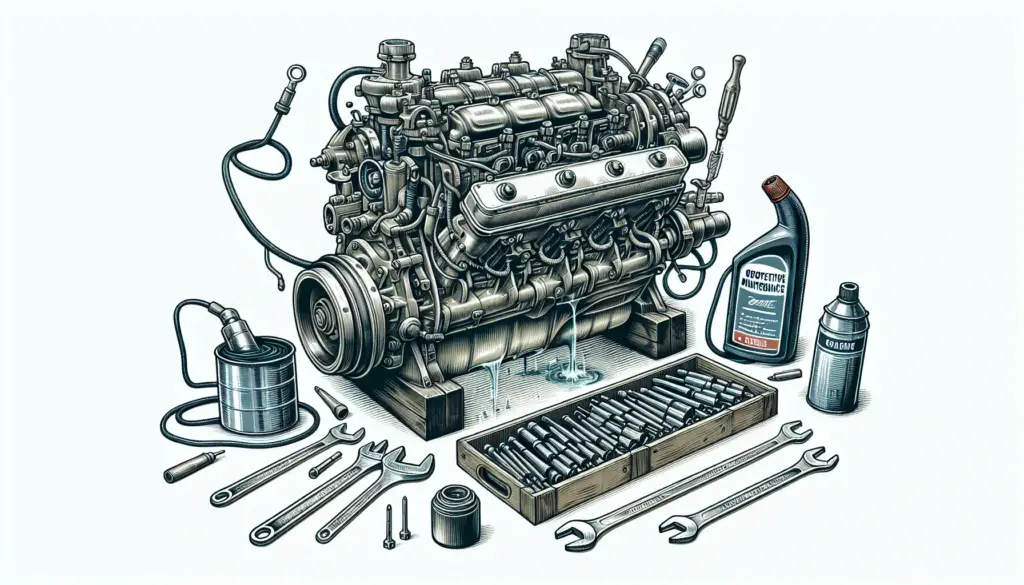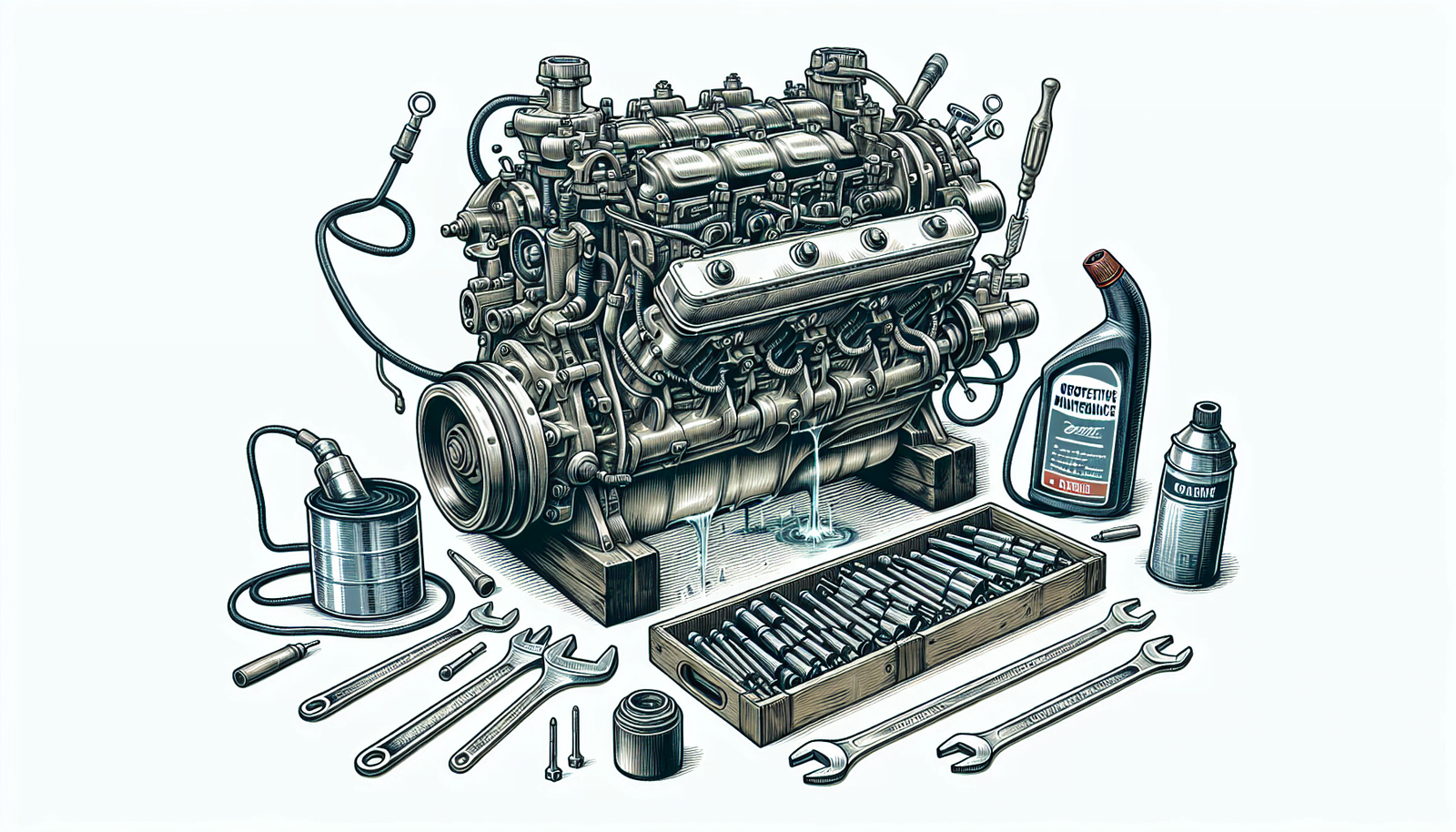You might pride yourself on your ability to reel in the biggest catch, navigate through choppy waters, or tell a captivating tale of the one that got away. But what about keeping your trusted fishing boat motor in prime condition? When it comes to extending the lifespan of your fishing boat engine, it’s more than just regular check-ups and oil changes. This article unveils the best practices you should follow for optimal engine performance and durability, helping you to keep your beloved vessel sailing smoothly for years to come.
Understanding Your Boat Engine
The first step towards ensuring a long and reliable performance from your fishing boat engine is understanding how it operates. By getting familiar with its basic functions and principles, you’re less likely to suffer from unscheduled breakdowns. Let’s begin by exploring the basics of your engine.
Knowing the basics of how your engine works
The boat engine isn’t vastly different from a car engine. At its core, it’s a machine designed to convert the energy from burning fuel to mechanical power. This energy propels your boat forward. Boats typically use either outboard motors (fixed on the outside of the boat) or inboard motors (built inside the boat’s structure). Knowing your engine’s specific type is vital as it influences how you’ll maintain and care for it.
Identifying important engine components
Every boat engine consists of several key components you should be able to identify, including the fuel system, exhaust system, cooling system, and lubrication system. Additional integral parts include the engine block, drive shaft, propeller, and pistons. Each part has a unique role in the functioning of the engine, and understanding these roles will make maintenance tasks and troubleshooting easier.
The role of an engine in a fishing boat
A boat meant for fishing needs a reliable and efficient engine to accommodate long durations on the water and potentially rough conditions. The engine’s role thus involves much more than simple propulsion. It powers all onboard systems, including navigation, refrigeration for fish storage, and mechanisms for hoisting nets or fishing equipment.
Regular Maintenance
Like every other mechanical system, boat engines demand regular maintenance to function flawlessly over a prolonged period.
Importance of regular check-ups
Regular check-ups help identify potential issues before they escalate into serious problems that could require costly repairs. These checks include looking at the clarity of the oil, inspecting the propeller, checking the fuel system, inspecting the belts, and considering the bilge for any signs of leaks.
Scheduling your maintenance
Creating a maintenance schedule can help you stay on top of these crucial check-ups. Many experts recommend a weekly engine check, especially when you’re out on the water regularly. However, a more thorough maintenance service is usually done annually or every 100 hours of operation.
Basic maintenance activities you can do on your own
With a bit of practice and the right tools, you can perform basic maintenance tasks yourself. These could include changing the oil, replacing the spark plugs, checking and cleaning air filters, and maintaining proper levels of coolant in your radiator among others. Nevertheless, for more technical tasks such as engine diagnostics or fuel system servicing, it’s a good idea to hire a professional mechanic.
Proper Engine Operation
The way you use your fishing boat engine significantly impacts how long it lasts and how well it runs.
Why how you use your engine affects its lifespan
Proper operation of your engine can prevent undue wear and tear. Excessive high-speed operation, for example, can put extra strain on the engine, reducing its lifespan. Similarly, frequent, abrupt stops and starts can harm the transmission system.
Proper startup and shutdown processes
Always check your manufacturer’s instructions to understand the correct procedure to start and stop your boat’s engine. Generally, allow the engine to warm up before using full throttle. During shutdown, let it idle a few minutes to cool down before turning it off.
Avoiding common operational mistakes
Some typical operational mistakes to avoid include over-revving your engine, ignoring the warning lights and gauges, and failing to regularly change your cooling water. In addition, never run your engine without sufficient oil or fuel, as this could lead to significant engine damage.

Fuel Management
Effective fuel management is an essential aspect of extending the lifespan of your fishing boat engine.
Choosing the right fuel
Your engine’s performance can be heavily influenced by the type of fuel you use. Always adhere to your manufacturer’s recommendation for the appropriate fuel type and octane rating to ensure optimal engine performance and longevity.
Effective fuel stabilization
Fuel stabilization is important, particularly if your boat isn’t used for extended periods. Over time, untreated fuel can break down and form deposits that can harm your engine. By adding a stabilizer to your fuel, you can prevent this degradation and extend its shelf life.
Keeping your fuel clean
Unwanted debris and water can contaminate fuel, leading to poor engine performance and possible damage. Regularly check and clean your fuel filters to ensure clean fuel is flowing to your engine.
Monitoring Engine Temperature
Keeping a close eye on your engine’s temperature can help prevent overheating issues and prolong your engine’s life.
Understanding your engine’s ideal temperature
A boat engine, like any other engine, has an ideal operating temperature. It varies based on different engine models and manufacturers. Check your owner’s manual for this essential information.
How to monitor engine temperature
Your boat’s dashboard should have a temperature gauge that helps you monitor the operating temperature. If it begins to rise above the recommended level, this could indicate problems like a failing water pump or blocked coolant passages that need immediate attention.
Action to take when engine overheats
Overheating can be an engine’s worst enemy, potentially causing serious damage. If your engine overheats, shut it down immediately and let it cool. Then inspect to identify and rectify any issues before restarting.
Lubrication
Regular lubrication significantly reduces wear and tear on your engine parts, hence extending their lifespan.
Choosing the right oil
The type of oil used for your engine plays a crucial role in how well it performs. Check your manufacturer’s guidelines for the specific type of oil recommended for your engine model.
Understanding frequency and methods of oil changes
Frequent oil changes ensure your engine components are properly lubricated. It’s generally advised to change the engine oil after every 100 hours of operation or at least once a year, whichever comes first. Always follow your manufacturer’s instructions regarding oil change intervals and methods.
Significance of lubrication in engine lifespan
Regular oil changes and proper lubrication greatly improve your engine’s lifespan. They reduce friction between moving parts, prevent overheating, and enhance overall engine efficiency.
Protecting Your Engine From Corrosion
Corrosion is a significant enemy of boat engines, especially those frequently exposed to saltwater. Properly protecting the engine from corrosion can deter unnecessary damage and extend its lifespan.
Causes and effects of corrosion
Corrosion typically results from the chemical reaction between metal and its environment – in the case of fishing boats, this is often saltwater. Corrosion can damage metal engine components, leading to leaks, breakdowns, and potentially catastrophic engine failure.
Using anti-corrosion products
There are numerous anti-corrosion products available in the market to help protect your engine. Regularly applying these products and maintaining a protective barrier can help prevent harmful corrosion.
Regular engine wash downs
After each venture out into saltwater, give your engine a thorough freshwater rinse to wash away the salt. This action alone can go a long way in preventing destructive corrosion.
Winterization For Off-Season
winterizing your engine can help protect it from potential damage during the off-season, maintaining its performance for when you get back out on the water.
Importance of engine winterization
During the colder months, if your boat remains unused, water left in the engine could freeze and cause severe damage. Therefore, winterizing your engine is essential to protect it from cold weather harm.
Steps to properly winterize your engine
The process of winterization include thoroughly cleaning your boat, changing the oil, adding antifreeze to the cooling system, applying fogging oil to the cylinders to prevent rust, and finally covering your engine to guard against dust and other debris.
Post-winterization care
Once winter is over, and it’s time to de-winterize, ensure you carefully check the engine and other components of the boat for any damages incurred during the off-season before you get back out on the water.
Ensuring Good Ventilation
Good engine ventilation is crucial for efficient operation and longevity of your boat engine.
Role of ventilation in engine performance
Engine ventilation allows for the escape of harmful gases and heat. It also ensures your engine has plenty of fresh air, necessary for effective combustion.
Maintaining proper ventilation
Regularly inspect your ventilation system for any obstructions. Dirt and other debris can clog these systems, therefore, keeping them clean ensures correct venting.
Signs of poor ventilation
Excessive heat and engine fumes in the engine compartment might indicate a ventilation problem. Remember, poor ventilation can lead to engine overheating and poor performance.
Addressing Small Issues before They Become Big
Tackling small issues immediately before they become big problems is a great way to maintain your engine’s performance and longevity.
Identifying minor issues
These might include unusual engine noises, excessive smoke from the exhaust, irregular engine performance, or sudden changes in fuel consumption. Such issues, though minor, could signal larger underlying problems.
Benefits of immediate repair
Addressing these issues immediately can save you from costly, major repairs in the future. Regular check-ups will help identify these minor issues early, and quick action can help maintain your engine’s performance and longevity.
How neglect can lead to major issues
Neglecting minor issues can lead to unnecessary wear and tear, leading to a decrease in engine reliability and even catastrophic engine failure. Being proactive about your engine’s health often pays off in the long run, enabling you and your fishing boat to enjoy many more adventures out on the water.



[…] is beyond your knowledge and expertise, it’s safer to consult a professional mechanic. timely professional intervention not only saves your boat engine from significant damage but also ensures your safety while […]